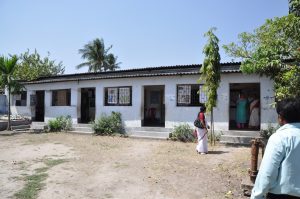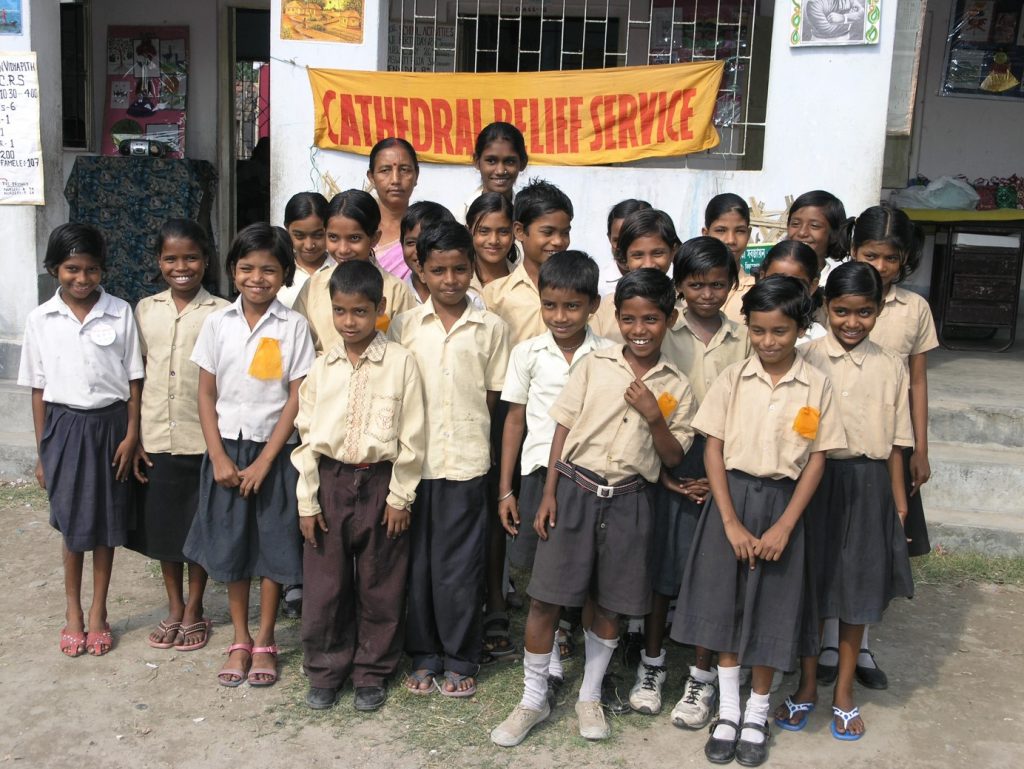About the area
Basanti Devi Colony is a small community located on the southern fringes of Bidhannagar, a planned satellite town developed in the late 1950s and early 1960s to accommodate the burgeoning population of Kolkata.
Bidhannagar is more popularly known as Salt Lake City as it was built in an area of marshy, shallow salt water lakes. Many were drained and the land reclaimed; other lakes were retained and are still used for fishing.
Salt Lake City is now a hub of economic and social expansion, and also home to Kolkata’s IT industry. Basanti Devi Colony is peripheral to the development. The settlement emerged in the 1970s when refugees from Bangladesh living in slums at Ultangdang, Hastings and Alipur were evicted and relocated.
Although the squatter communities have been resident in the area for around 40 years, their living conditions are still poor. Most families live together in single rooms within buildings constructed to house a large number of families. The population of the area is about 3,000 (440 families), of which about 1,800 are children. 90 per cent of families are Hindu and 10 per cent Muslim. Employment is available pulling rickshaws and driving, also in fishing. Some women work as domestic servants.
Women tend to occupy an inferior position in the community and are often exploited and abused. Child marriages are common, while desertion and re-marriage often without a proper divorce leads to legal disputes concerning property in the area.
About the local organisation and history of CRS involvement
 CRS started working at B D Colony in 1976 to provide health care and other basic emergency services to the residents. As the project developed, CRS leased the land to the community who set up their own community centre, and in 1980 CRS withdrew from the area.
CRS started working at B D Colony in 1976 to provide health care and other basic emergency services to the residents. As the project developed, CRS leased the land to the community who set up their own community centre, and in 1980 CRS withdrew from the area.
In 1995 committee members of Basanti Niketan Vidyapith and Basanti Seva Samiti approached CRS requesting that they re-engage with the community and provide support for the education programme which had about 300 students enrolled in the school.
CRS has been supporting the community ever since. A concrete school building (photo right) was constructed in 2003 funded by the German Consulate in Kolkata, providing proper classrooms and a play area for sporting activities.
Current CRS programmes

The education programme is for pre-primary and primary age children (3 to 10 years). About 70 children attend each session. The curriculum is based on ‘joyful learning’ methods and there is an emphasis on dance, music and drawing. The aim is to ensure that these children get a chance to be enrolled into government primary schools. Children are given a midday meal to supplement their nutrition. CRS also helps each child to open a bank account and they are encouraged to save money.
The children are encouraged to participate in additional activities and there is a very active Shishu Jagat (Children’s World) club at B D Colony. The children have been involved with environmental awareness campaigns and tree planting, a summer camp focused on arts and creativity, and organizing celebrations for anniversaries and events such as International Literacy Day. The formation of an Under 10s football team has also been particularly popular.
The women’s empowerment programme offers training in tailoring, embroidery and beautician skills and other needs-based training. Once they have completed their courses students are encouraged to form self-help groups, such as the Women’s Empowerment Group (WEG), and establish income generating activities. Some former students have joined CRS’s Nari Dana project.
The health programme offers a school health clinic and referral to government hospitals when required. Many of the school children receive iron supplements for iron deficiency anaemia. Awareness camps are held in the community to spread messages about good health and hygiene. Health camps are also held in collaboration with other agencies targeting particular health issues. Drinking water facilities have also been provided at the school.
Success stories
“I remember a didi coming to my house and enrolling me in school after a long argument with my father, who wanted me to work in the local fishery. The teachers ensured that I had books at the beginning of the year and a fresh set of school uniform, even though I knew my parents could not pay for them. After I came top in Class IV, I remember my class teacher taking me to Ramkrishna Mission Vidyapith for the admission test. I was really scared being in the big office room of the school Principal. Later I heard that I had got one of the highest scores on the test. It was the best day of my life!”
– Mohan Bor, former student of Basanti Devi Colony school
“I attended the tailoring course and really enjoyed learning new skills. But I also knew this was my chance to help my family. I gathered several clients and gradually my work expanded. I now have my own tailoring shop called Rahul Tailors. My husband is unemployed at the moment so he helps me to manage the shop. We make about Rs. 3,500 every month.”
– Tapashi Jana, former women’s empowerment programme student, Basanti Devi Colony
“My father sells ice cream from a cart. My mother works as a domestic help. But I dream of becoming a teacher. I work hard and I often come first in class. I also love to paint.”
– Saraswati Ghosh , student at Basanti Devi Colony school
“My father died when I was very young so my mother had to work as a housemaid to provide for us. She sent me to Basanti Niketan Vidyapith school and I was a good student. I passed my board examinations with flying colors and went on to study for a Bachelor’s degree. This is quite unusual for someone from my community of Bidhan Nagar. I joined the Green Brigade (traffic police) and am a successful policemen. I have also opened a flower shop to add to the family income. People should never give up. If you work hard there are possibilities to succeed.”
– Sukumar Mondol, resident of Basanti Devi Colony
“When I was 3 years old I started to go to the CRS school at B D Colony. But then my father, who is a rickshaw puller, got sick. I had to go to work to earn money for our food. First I worked in a bakery where I earned 50 Rupees a week [about £0.50 / $0.75]. Then I worked in a leather factory where I was paid a little more. I attended classes whenever I could and also joined the vocational training programme. Then I decided to open my own tea stall. I am always telling parents in my neighbourhood to send their children to school. Going to school is important to make a better society.”
– Amit Das, student at Basanti Devi Colony school
“I am currently 25 years old. I was able to study up to Class XII then I took training in tailoring offered by CRS. After that I decided to do the beautician training course too. Now I work in a beauty parlour and my income helps to support our family. My mother works as a domestic help and my father is a daily labourer so their income is small. I have two sisters who study in Class XI and VII. My dream is to help them to complete their studies so that they can make their future better.”
– Rupa Singh, former CRS women’s empowerment student, Basanti Devi Colony
“I am studying at Basanti Devi School in Class III. My mother works as a domestic help and my father along with my elder brother works as a daily labourer. I love reading and drawing. I also love to dance and sing. I like taking part in all activities that are held in my school. I especially thank CRS for selecting me for the new computer training. I enjoy all the classes and the teachers make us understand in our local language. I am learning so much and in future I will continue my education in computer science.”
– Tapasi Roy, student at Basanti Devi Colony school
“I was born in Bangladesh but then my family moved to West Bengal in search of work. I am now 11 years old and we live in Kolkata, where my dad and older brother work as daily labourers and my mum is a domestic helper. I joined B. D. Colony school in Class III and got first position so I was promoted to Class IV. I play football on the school team and also joined the computer training course.”
– Ratan Sarkar, student at Basanti Devi Colony school
Support is needed to continue this work at Basanti Devi Colony. Funds are needed to cover the costs of the children’s midday meal, medicines for the clinic and iron deficiency anaemia campaign, counselling for children with problems, and materials to set up an environment club to raise awareness.
